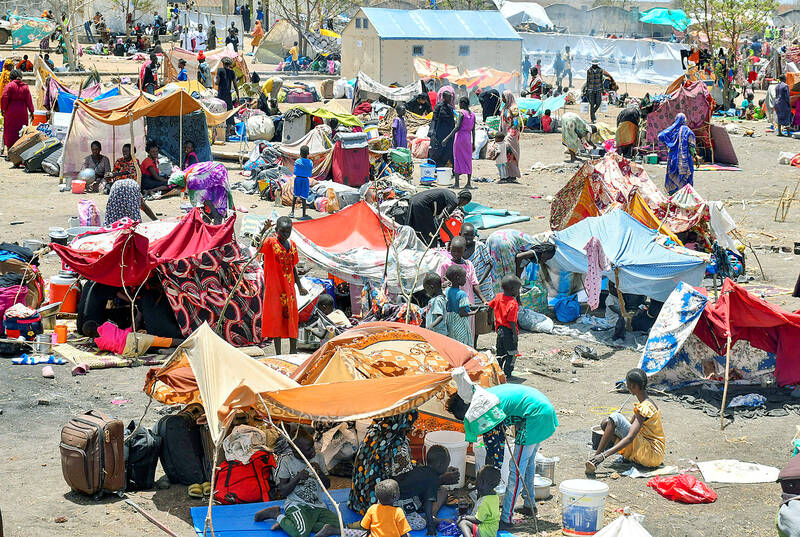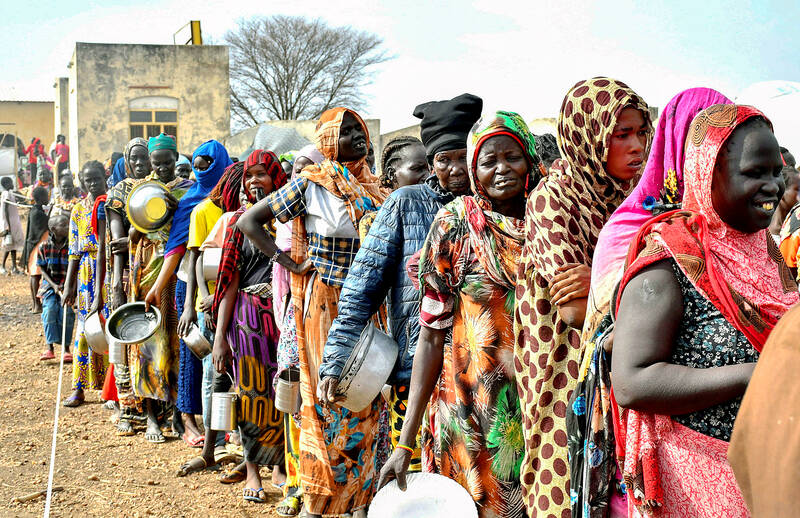The last place Lina Mijok wanted to go as she fled fighting in Sudan was back to her own country, South Sudan, which she had left as civil war erupted in 2013, but when Sudan’s army started battling the paramilitary Rapid Support Forces in the streets around to her home last month, South Sudan was the only place she and her two young children could reach.
“I would not have come back to South Sudan. I would have gone anywhere, but I had no choice,” the 26-year-old said.
She had managed to carve out a new life for herself as a housemaid in the city of Omdurman, across the River Nile from Sudan’s capital, Khartoum.

Photo: Reuters
Then the shots started ringing out, and her family had to pack up and leave that behind them — all of them apart from Mijok’s husband.
He had to stay behind as they did not have enough money to pay for his place on the trucks and buses that carried Mijok, their son and their daughter to the border, a nerve-wracking two days on bush roads.
They are now among thousands camping out in South Sudan’s Renk County, in a dilapidated university campus, its buildings pockmarked by bullets from fighting a decade ago.

Photo: Reuters
The refugees have made basic shelters out of sticks and pieces of fabric. The UN refugee agency, UNHCR, and other aid groups are distributing food, water, buckets, blankets and mats.
“The heat is killing us and some people have gone four days without eating, and there is no place to sleep, and the children are getting sick,” Mijok said.
She hopes the UN would help her move to another country.
The fighting has turned the humanitarian situation on its head.
Up to last month, more than 800,000 South Sudanese refugees lived in Sudan, refugees from decades of conflict. Since the fighting erupted in Khartoum, the UNHCR has registered more than 30,000 people crossing into South Sudan, more than 90 percent of them South Sudanese. The true number is likely much higher, it says.
Aid agencies fear the influx would worsen an already dire humanitarian crisis in South Sudan, where more than 2 million people are displaced and three-quarters of the 11 million population need aid.
South Sudan gained independence from Sudan in 2011 after two decades of north-south conflict. Civil war broke out there barely two years later, killing an estimated 400,000 people.
“South Sudan is one of UNHCR’s most underfunded crises already and we are now mobilizing to support this new influx,” agency spokesperson Charlotte Hallqvist said. “We urge the international community not to forget about South Sudan.”
Like Mijok, Suzan William, 36, fled the civil war in 2013 and rebuilt her life in Sudan, working as a nurse in Khartoum. Now she is back in her homeland, camping in Renk with her four children.
“People say there is no stability in South Sudan, so we decided to build houses in Sudan, but now also there is no stability in Sudan. What should we do? We don’t know,” William said.

Kehinde Sanni spends his days smoothing out dents and repainting scratched bumpers in a modest autobody shop in Lagos. He has never left Nigeria, yet he speaks glowingly of Burkina Faso military leader Ibrahim Traore. “Nigeria needs someone like Ibrahim Traore of Burkina Faso. He is doing well for his country,” Sanni said. His admiration is shaped by a steady stream of viral videos, memes and social media posts — many misleading or outright false — portraying Traore as a fearless reformer who defied Western powers and reclaimed his country’s dignity. The Burkinabe strongman swept into power following a coup in September 2022

‘FRAGMENTING’: British politics have for a long time been dominated by the Labor Party and the Tories, but polls suggest that Reform now poses a significant challenge Hard-right upstarts Reform UK snatched a parliamentary seat from British Prime Minister Keir Starmer’s Labor Party yesterday in local elections that dealt a blow to the UK’s two establishment parties. Reform, led by anti-immigrant firebrand Nigel Farage, won the by-election in Runcorn and Helsby in northwest England by just six votes, as it picked up gains in other localities, including one mayoralty. The group’s strong showing continues momentum it built up at last year’s general election and appears to confirm a trend that the UK is entering an era of multi-party politics. “For the movement, for the party it’s a very, very big

ENTERTAINMENT: Rio officials have a history of organizing massive concerts on Copacabana Beach, with Madonna’s show drawing about 1.6 million fans last year Lady Gaga on Saturday night gave a free concert in front of 2 million fans who poured onto Copacabana Beach in Rio de Janeiro for the biggest show of her career. “Tonight, we’re making history... Thank you for making history with me,” Lady Gaga told a screaming crowd. The Mother Monster, as she is known, started the show at about 10:10pm local time with her 2011 song Bloody Mary. Cries of joy rose from the tightly packed fans who sang and danced shoulder-to-shoulder on the vast stretch of sand. Concert organizers said 2.1 million people attended the show. Lady Gaga

SUPPORT: The Australian prime minister promised to back Kyiv against Russia’s invasion, saying: ‘That’s my government’s position. It was yesterday. It still is’ Left-leaning Australian Prime Minister Anthony Albanese yesterday basked in his landslide election win, promising a “disciplined, orderly” government to confront cost-of-living pain and tariff turmoil. People clapped as the 62-year-old and his fiancee, Jodie Haydon, who visited his old inner Sydney haunt, Cafe Italia, surrounded by a crowd of jostling photographers and journalists. Albanese’s Labor Party is on course to win at least 83 seats in the 150-member parliament, partial results showed. Opposition leader Peter Dutton’s conservative Liberal-National coalition had just 38 seats, and other parties 12. Another 17 seats were still in doubt. “We will be a disciplined, orderly